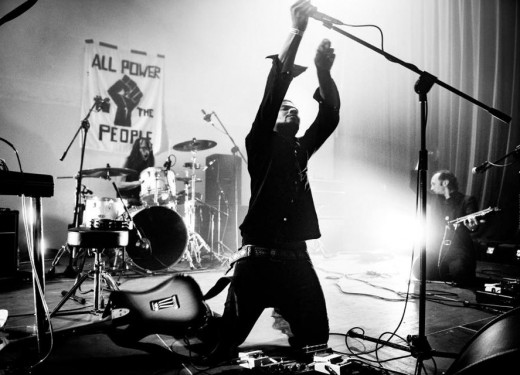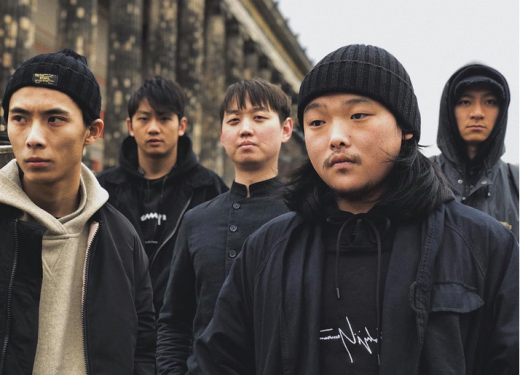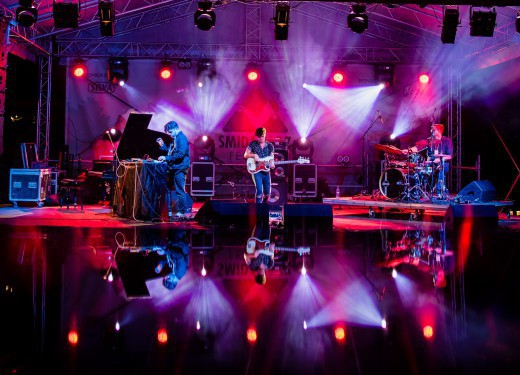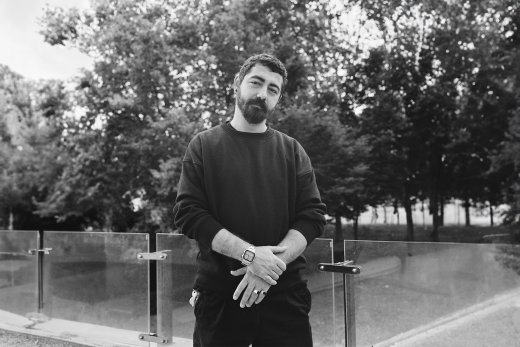
Disturbing the Comfortable - Comforting the Disturbed is On-U Sound's motto, Adrian Sherwood’s longstanding label. The English record producer is specialized in the genres of dub, reggae, trip-hop and industrial music, but he is also an artist who will hardly refuse to experiment with any kind of music genre. Recurring through our interview is the theme of avoiding musical safe explorations, taking the audience out of their comfort zone and the demystification of music through the lack of enthusiasm from music lovers.
Adrian Sherwood has created a distinctive production style based on the application of dub effects and dub mixing techniques inspired by King Tubby, Augustus Pablo and Lee Scratch Perry – the original pioneers of the Jamaica born genre.
In his extensive career he has worked with wide a variety of reggae artists such as Prince Far I, Lee Scratch Perry, Sly and Robbie, Bim Sherman, Little Roy, as well as the alternative musicians Mark Stewart & The Maffia, Keith LeBlanc, Doug Wimbish and Skip McDonald. He has remixed since the eighties artists like Einstürzende Neubauten, Coldcut, Depeche Mode, Primal Scream, Pop Will Eat Itself, Sinéad O'Connor, Skinny Puppy and Salmonella Dub. His most eclectic collaborations are with Little Axe, Cabaret Voltaire, Ministry, Nine Inch Nails and Bristol’s emblematic dubstep producer - Pinch, releasing in the last 40 years over 500 versatile albums.
This interview was realized after Sherwood show in Bucharest, at Control Club. We are very thankful to the promoters for facilitating this conversation and for promoting artists such as Adrian Sherwood.
Things always change in this industry. The whole digital thing is the same for film. You can copy anything now, so the importance of music as something to discover and buy is not the same anymore. People still love artists and music, but they think of it in a different way and they consume it differently. In the eighties we had some of the first gigs in Holland, the first time reggae went to the Netherlands, Roy Lema from Midnight Records in Amsterdam was our host. We went there with Prince Far I & The Arabs. Right now we got bands and people gigging in India, Mexico, Peru, on every corner of the planet. Next week I am going to Berlin and then I am going to Australia and New Zealand. You didn’t go to those places as a small or medium artist in the seventies and eighties, you just couldn’t, so a lot of things have changed for the better. You can play all over the world now and get booked: Russia for example, which was unheard of in 1980. I did go in those times to Berlin, but it was not very common. This is a plus. The world has opened up and we travel far more. There are many more festivals you can play now, thousands compared to what we had awhile back, but I can see some changes: like you can’t really tour like we used to, there aren’t any five shows in a row anymore. In the past we had five days one after the other in the UK and then a Saturday gig in Belgium or something like that. The clubs have deteriorated.
Lots of things have changed, the world is mutating, but one of the biggest minus sides is that it’s harder to sell music and it’s all balanced towards getting paid for live music, so you have to do more shows to live. I don’t have a secret income, so I do more shows. So does Dennis Bovel, another dub and reggae producer, but we are now blessed with the fact we might get invited to India or to Japan. I’ve been to the Nippon Island 50 times! I’ve produced Audio Active there and one of my last albums for Nisennenmondai, an experimental new young band. I’ve done a lot of things in Japan and Poland, I went there as far back as ’86.
Well, you’ve got a situation where for most people, music is like a small part of their lives. For us it is still very important, we love the music and we listen very carefully to what other producers and artists are doing, but most people just don’t care, they are worried about eating and they have records, but it’s just not that important. That people are into vinyl it’s fantastic and I love that, but we as music fanatics love what’s going on, but it’s not like it used to be. I am insistent though, I have reissued like ten albums a year on vinyl in the past couple of years.
The funny thing is that if I look back to the eighties or even the seventies, things were similar: lots and lots of records were being put out. It was hard even then to get noticed. If a record came to us from Jamaica, it was usually a big artist like Dennis Brown, or another music legend. We were very little then, anything we did we had to fight very hard to get noticed. It is the same now, but in those days it was exciting because you went into the record shop and discovered new things. It was brilliant because you could have discovered some jazz record from Romania, Poland or some weird record from Eastern Europe, or German techno that we discovered then by accident in England, and remember, there was no internet, everything was analogue regarding the search of music.
The whole dub scene of present days is weird. Not weird as in wrong, it’s just when I was involved in releasing all the first dub records in the seventies in the UK, a lot of record companies in London pushed the scene. If you actually look at it, there’s never been many dub records in Jamaica. It has never been a popular genre. People weren’t that much into albums, even nowadays you don’t see Jamaicans consuming them.
Returning to the dub world, it has evolved from where you originally had a record with an A side and a B side. As a kid I would like the song on the B side more than the other one and all of a sudden they started putting version on the other side. And it was just the rhythm without the voice, so I was very pissed off, I felt cheated. I wanted another song, not this instrumental. Bit by bit they started to change that, I remember Breakfast in Bed by Lorna Bennet and on the other side there was Skanking Bed by Scotty. This time I liked it, there were two versions on each side of the seven inch. Sooner than I knew, dub versions started to get pretty good and in no time, the first dub albums arrived. King Tubby Meets The Upsetter At the Grassroots of Dub, Augustus Pablo’s Ital Dub which is mirroring Bob Marley’s Natty Dread album. By this time there were some other interesting things like tunes from The Light of Saba, that had little reverbs and effects on them.
Record companies in London realized that people were getting interested in version, so the producers were coming in with lots of dub tapes and versions and a lot of these albums were put together by record executives. They weren’t actually a work of art, like the envisioned proper dub album. The Scientist’s records were named by the man of the record company, Chris. He took Junjo Lawes dubs and mixed them by Scientist and put his name on it. They weren’t conceived by Scientist, weren’t even conceived by Junjo Lawes, but the public thought it was great. They just sat at home smoking a spliff and say: “Hey this is a great album!” Actual works of art are conceived by the producer, like East of the River Nile, Blackboard Jungle or Brand by Keith Hudson.
Respect to Chris, who was a mate of mine, he’s the good bloke that ran Greensleeves Records, who was pragmatic with putting those dub records together: he said if we do this, put them together, we don’t have to pay any royalties to a singer. That was how the whole scene started building.

That is the only unique thing about Jamaican music, a good song will have a lot of singers on the instrumentals, like they are thousands of versions of the Stalag Riddim. If you hear a new one it’s still a new version, people still like it and it’s exciting.
Journalists ask me “dub, dub, dub, dub” well the fact is simple, if you got a good riddim and you put two-three vocalists on it it’s great and that’s it. And if you leave it instrumental, with lots of effects on it the dubheads like it. I still think there is room for a band, if it came along, using all the ingredients of dub, and with the formula to become massive internationally.
We were just trying to marry out two styles together. The first album, Late Night Endless, was well received, but when I think of the second one, Man Vs. Sofa, I sometimes think we might not make another album together. But that’s life! Maybe the problem is that it should have been simpler, just a techno, a dubstep record or whatever, it would have probably done a lot better. Very often over the years I’ve had that problem, with Little Axe for example was the same, it was too weird for the blues people and too bluesy for the reggae or the funk people.
I think Man Vs. Sofa is a great album that people would still love in ten years from now. You check things in ten years and they would put a list of the best albums in a decade and our record would still not sound like 2017. If as an artist you get to make a record with a personal touch that doesn’t sound like some other person’s work, people won’t point towards anything, they would just feel its uniqueness. What is the point? I repeat myself a lot but I am not trying to sound like another artist! You don’t have to push yourself, but you have to find your style, have your own vibe.

One of my secret weapons are my loads of tunes with him. And none of these songs have come out yet, they are fresh. We have finished a new record together in Jamaica and it is stunningly good. I played only a couple of tunes of it like Cricket on the Moon. The album is coming out this year in August on On-U Sound and through a bigger company in order to be better promoted. I am very proud of it and I’m not being funny. Unlike what I did last year with Coldcut, this will have no collaborations. It’s just Lee on it, me and the On-U crew. It sounds excellent!
Last year in November I went to Jamaica and I spent a week with him there. He doesn’t wake up until four o’clock in the afternoon, but we stayed up all night and we had quite some good hours to work every day. I did it all in his house on a very small machine. Some of the rhythms that I gave him I derived from ancient Lee Perry tunes. I completely fucked them up, I’ve tuned them down, mangling them and took other things and pasted them on his sonic and my mind just melted. It sounds ahead, like 2020. It’s not sounding retro, because I don’t see the point in making a record that sounds like the past or an old record of his.
The problem is different, how to get yourself noticed. It is a present issue. That women’s album I was playing tonight with the War version, I have a whole album I have been making for ten years now. And if I release it and can’t promote it, I might as well piss on my own leg. It becomes a waste of time. Did you hear the Ghetto Priest album I did last year? It is a very lovely album, and I have spent about £6,000 of my own making and I just gave it to Ashley and Joe of Ramrock Records to release, because I wanted to see it come out. It loses me money, so if I’m financing these productions, I want to see them promoted. So in answer to your question, there’s so much music coming out that there might be some really good stuff, but then there’s loads of average things. Some of these have people spending money and promoting it. “The best thing in the world and you should listen to it” and then I go: “Is it me or I just don’t get it?” People are promoting the life out of something and everyone can promote themselves now, so you have to ask yourself as a producer, how can you get your stuff handled properly? How can I do it?
Let me explain this better. A lot of the people that bought On-U Sound records in the eighties are grandparents now. They are 50 or 60, but I have young fans as well. Just the other day I was in Manchester and all these really young people knew all the tunes, they were really knowledgeable. It made me very happy. But a lot of people who respect me from back in the seventies and eighties they don’t go out anymore, they are old! So the On-U Sound history is fantastic and I am still getting a lot of love, I get to hear: “You influenced this band, you influenced that whole genre or generation of artists” and it all makes me feel great. But you are wrong and the reality is, try getting somebody to open their wallet up and buy a CD or a digital release or an LP, just get out of their lazy ass from the TV and come to a gig! I’ve got a good name, I am very grateful for that, but capitalizing on it is not a full grown conclusion, like I made a good record that is going to sell. I’ve made some of the best records that people don’t know or are just discovering now.
Do you know the Harry Becket album? It is called The Modern Sound of Harry Becket, it’s ten years old now and it’s an On-U Sound jazz-dancehall-reggae record with a most brilliant jazz musician – he is dead now as well. Harry Becket was a legend in England! Two records I’ve made, Modern Sounds and Panic Grass & Fever Few are really good, I have people coming in the street to me to tell me how these have changed their lives, but they haven’t sold and became hits. We are living in ignorant times, not only me, but all artists making music out there want to have people listening to what they’ve done and go and buy them. Everyone has to do both this work of making music and also doing gigs. On both sides we are facing difficult times, some records don’t sell and some gigs are poorly attended. You have gigs with thousands of people going mental or just ok moments. You realize sometimes getting off stage that they are all on drugs and they go mental for the next act just as well. It’s a funny world the music world.

Most of the voices we’ve recorded ourselves. Whenever I do a set, I know what works. If I have Prince Far I sing Smoke Up Your Collie Weed, I know it goes hand in hand and fits next to the Congo Natty songs I did. I got samples that I used on the Congo Natty recordings and I have them on my pad, so I can hit it and pull this batch of songs out and then drop it back in. So I have this system on which I build my sets. I also got snares that I’ve sampled from my own records, but classic reggae records also. I have mashed them up so they got a fatness to them. For example, I’ve got the metal snare that I use quite a lot and I know that these sounds are going to liven up the sonic for the people listening. It’s literally a frequency thing. I’ve got my noise machine that no one else can play and that has its own sound.
I owe everything to John Peel, he got me started. Because he played the very first record I made, which is being re-released this year, I made it in 1978 when I was 19 and came out initially when I was 20, it was Creation Rebel – Dub From Creation. Our next gig, the first one for 36 years will be in Berlin. John Peel somehow got this record and I was sitting in a car with Prince Far I, in Notting Hill near the all night supermarket, this was late like ten o’clock in the evening. John Peel starts the show and he said: “I’m going to play now the best dub record ever made in England.” And suddenly on comes my record. And he played back-to-back the first three tracks from Dub From Creation. And Prince Far I was: “Bloodclot!” I was completely fucked. “It’s my record, Far I, he’s playing my record!”.
Initially I’ve offered it to Jeff Travis at Rough Trade Records and he was “Sorry man, I don’t really think it’s for us…”. The next day without a call he came in to my home asking me to press 200 copies of that album. I said “Oh, great!”. And that was John Peel, he called us for a session with Prince Far I and Creation Rebel and he championed me through the next ten years. He played most of my releases from back then and I owe him a great deal. He was such a great man, he would play the weirdest stuff and then a couple of years later that band became big.
I think he just realized people don’t want normal, they want something fresh and special, he tried to take the audience out of their comfort zone. My manager is a big fan of his work and he keeps buzzing me: “Go out of your comfort zone. Do a record with Nisennenmondai! Do an album with Coldcut. Don’t go safe!”. Obviously, people don’t want another boring reggae album, they need a middle of the road type of record.
It’s sad that they were trying to get John Peel off the air, give him less hours in his last days. Trying to put him on later and later at night, as the BBC management thought he was too eclectic. Those people are now blessed by his memory, but just before he died they were trying to give him less time. It’s funny! It’s the same with David Rodigan, they tried to push him as late at night as possible. My friend Steve Barker, a very interesting DJ just like John Peel, a great important man, he runs BBC Radio Lancashire and he’s got a show named On The Wire which is the longest running reggae and dub radio show in British history! He’s fantastic, but people don’t want shows like that, they prefer more of the same, easy, things that don’t cause any controversy, unchallenging music. So I don’t think Peel will ever be replaced, but there are lots of new cool shows around, the new punk music is right now grime – the proper rebel music. That is the voice of young Britain at the moment! That’s exciting for the younger generation.
My son has got a studio in London. He is literally voicing and recording vocals every day for grime artists. He is massively busy and he is a very good producer! He is just obsessed with this sound and all of his friends, everybody around him, just love grime. The truth is that this sound is a revolutionary sound.
Outlook Festival in Croatia are championing it too. I think it is fresh and it’s an interesting phenomenon as you’ve mentioned John Peel, grime was pirate radio music. In the beginning the authorities were really fighting against it.
It’s not that good. I can compare it to France for example as you’ve mentioned High Tone. When they do a festival or a gig, they pay a percentage of their earnings into a tax poll, so that when they haven’t got any work, they get some money. The French say “touch money” – toucher d’argent. So all the musicians in France, they happily pay from 300 euro per gig, let’s say 100 into this system and then after some time they get the money back. They get an amount per year to buy new musical equipment for studios too. We’ve got the Arts Council in the UK, but it’s been so stripped back, that it literally goes to only a few people. Considering the amount of output the British have had over the years it’s not alright.
But even with all this financing, the problem you got nowadays is that if you are spending too much money on making an album, you are going to lose most of it. Nobody’s going to buy it. People don’t buy CD’s anymore. They don’t care anymore. To have all the effort put into worth, the only way to do it like I do, blasting it out on a sound system at a gig. Force for a bit of attention, you have to build up for a live following and then take them to the next gig. If you suddenly got a couple of hundred or three hundred people at a gig and everyone’s excited at what you are doing, then it’s worth pursuing it. There is no point in making an album before you build a live following. If you do that and make and sell 20-30 CD’s a gig then with 40 shows a year you can sell 1200 copies a year. And then you sell 1200 through other outlets and after 3 years you sell 5000 albums. It’s a very hard goal to reach though. Build a scene for your music and then go on from there. It used to be easy to do it, but not anymore as they’ve destroyed the importance of the art and the music.






